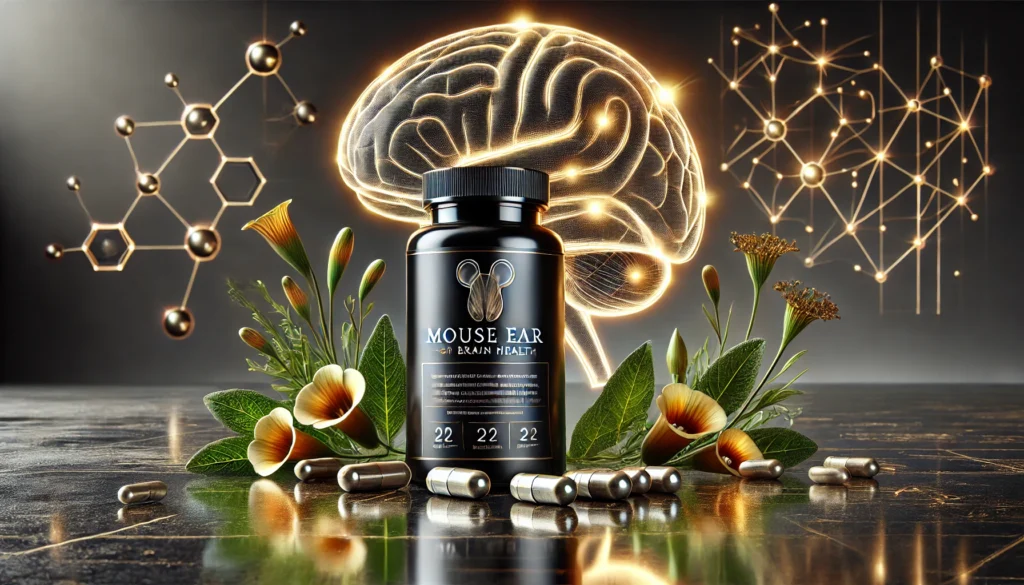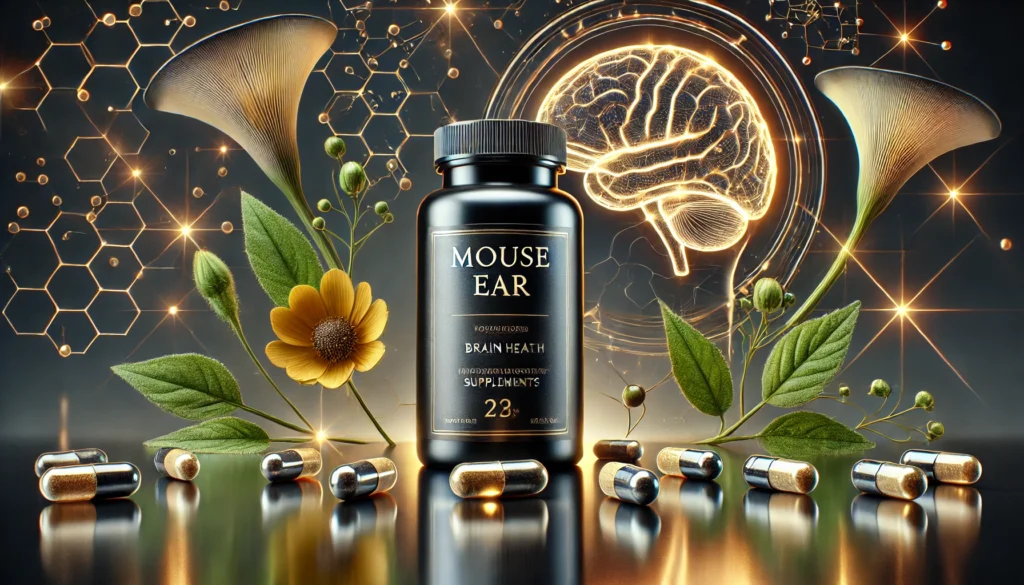Mouse Ear (Cerastium vulgare), a common herbaceous plant in the Caryophyllaceae family, has garnered interest in recent years for its purported nootropic effects. Known by other names such as “chickweed” or “snow-in-summer,” Mouse Ear has been used in traditional herbal medicine for a variety of ailments, from minor wounds to inflammatory conditions. Increasingly, however, the focus has shifted toward its potential as a cognitive enhancer. This article explores the scientific properties of Mouse Ear, its active compounds, mechanisms of action in the brain, and its viability as a nootropic supplement. It also includes dosage guidelines, side effects, and potential drug interactions, as well as safety considerations for individuals with specific health conditions.
You May Also Like:
Sources of Mouse Ear
Mouse Ear is widely distributed across Europe, Asia, and North America, often found growing in temperate regions. The plant thrives in disturbed soils and is a common sight in gardens, lawns, and along roadsides. Mouse Ear gets its name from its small, hairy leaves and its habit of spreading quickly in areas with disturbed earth. The plant has been historically utilized in traditional medicine for its mild diuretic, anti-inflammatory, and mild sedative properties.
In herbal medicine, the entire plant, including leaves, stems, and flowers, is used. It is often prepared as a tea, tincture, or capsule, and occasionally used topically in poultices for its anti-inflammatory effects. While Mouse Ear is not commonly marketed as a mainstream nootropic, its historical use, coupled with emerging research, is drawing attention for its cognitive-enhancing potential.

Chemistry of Mouse Ear
The active compounds in Mouse Ear that are believed to influence brain function primarily include saponins, flavonoids, glycosides, and tannins. Each of these classes of compounds has distinct physiological roles that may contribute to the plant’s therapeutic and nootropic effects.
- Saponins: These are a group of naturally occurring compounds found in many plants, including Mouse Ear. Saponins possess a unique chemical structure that allows them to interact with cell membranes, facilitating the absorption of other beneficial compounds. Saponins are known to support cognitive health by promoting the proper function of brain cells. Some research suggests that saponins can improve blood flow to the brain, which may enhance mental clarity and cognitive function.
- Flavonoids: Known for their antioxidant and anti-inflammatory properties, flavonoids in Mouse Ear can protect brain cells from oxidative stress. Oxidative stress is a major contributor to cognitive decline and neurodegenerative diseases such as Alzheimer’s and Parkinson’s disease. By scavenging free radicals, flavonoids help protect neurons from damage, thereby potentially improving long-term cognitive function.
- Glycosides: These compounds are often involved in the regulation of neurotransmitter activity, which can enhance brain signaling. Glycosides in Mouse Ear may influence levels of acetylcholine, a neurotransmitter critical for memory and learning processes.
- Tannins: Tannins have anti-inflammatory and astringent properties that can help reduce neuroinflammation, a key factor in many cognitive disorders. By modulating inflammatory pathways in the brain, tannins may contribute to overall cognitive health and protection.
Physiological Mechanisms of Mouse Ear in the Body and Brain
The biochemical properties of Mouse Ear suggest a range of potential effects on the brain and body. The herb’s most significant nootropic effects likely stem from its ability to promote neuronal health, improve circulation to the brain, and reduce neuroinflammation.
- Enhanced Blood Circulation to the Brain: Saponins in Mouse Ear may help improve the permeability of the blood-brain barrier, allowing more nutrients and oxygen to reach brain tissue. This increased blood flow could enhance overall cognitive function, including memory, attention, and mental clarity. Enhanced blood circulation can also contribute to reduced mental fatigue, a common issue among individuals under high cognitive load.
- Antioxidant and Neuroprotective Effects: Mouse Ear’s flavonoids act as powerful antioxidants, protecting neurons from oxidative damage. Oxidative stress is a key contributor to the aging of the brain and the development of neurodegenerative conditions. By neutralizing free radicals, flavonoids can protect brain cells and reduce the risk of cognitive decline associated with aging and environmental factors.
- Anti-Inflammatory Effects: Chronic inflammation in the brain, often referred to as neuroinflammation, is linked to cognitive dysfunction and neurodegenerative diseases. Tannins and flavonoids in Mouse Ear have been shown to possess anti-inflammatory properties, which could help reduce neuroinflammation and promote a healthy brain environment. By lowering inflammation, Mouse Ear may aid in maintaining cognitive function and preventing the onset of disorders like Alzheimer’s or Parkinson’s disease.
- Neurotransmitter Regulation: Glycosides in Mouse Ear are believed to have a modulating effect on neurotransmitter systems, particularly acetylcholine, which is central to memory and learning. Acetylcholine is critical for cognitive tasks such as forming memories and learning new information. By supporting proper neurotransmitter balance, Mouse Ear may enhance cognitive function and improve memory retention.

Nootropic Benefits of Mouse Ear
The emerging understanding of Mouse Ear’s chemical constituents and their actions suggests several potential cognitive benefits that align with the criteria for nootropics—substances that enhance brain function in healthy individuals. While research on Mouse Ear as a nootropic is limited, the following benefits can be hypothesized based on its chemical properties:
- Cognitive Enhancement: The combination of enhanced circulation, antioxidant effects, and neurotransmitter modulation may improve overall cognitive performance. Regular supplementation with Mouse Ear could theoretically lead to enhanced mental clarity, focus, and productivity, particularly in individuals experiencing cognitive fatigue.
- Memory Improvement: Acetylcholine is a critical neurotransmitter involved in memory formation. By supporting the regulation of acetylcholine, Mouse Ear could potentially improve memory, particularly in individuals with age-related cognitive decline or those under mental stress.
- Neuroprotective Effects: The antioxidant and anti-inflammatory properties of Mouse Ear’s flavonoids and tannins suggest that it may provide neuroprotective benefits. By reducing oxidative stress and neuroinflammation, Mouse Ear may help preserve cognitive function and prevent the onset of neurodegenerative diseases.
- Mood Regulation: While Mouse Ear is not typically used as a mood-altering supplement, its neuroprotective and anti-inflammatory effects may indirectly contribute to better emotional well-being. Chronic inflammation and oxidative stress are often linked to mood disorders, and by addressing these issues, Mouse Ear could support mental health over the long term.

Dosage and Supplementation Guidelines
As Mouse Ear is not commonly used as a mainstream nootropic, clear dosage guidelines for cognitive enhancement are lacking. However, based on traditional uses and the known bioactive compounds, the following general recommendations can be made:
- General Dosage: For cognitive enhancement, a typical starting dose is around 250–500 mg of a standardized Mouse Ear extract. This dose may be taken once or twice daily, depending on individual tolerance. It is important to start with a lower dose to assess any adverse effects.
- Supplement Forms: Mouse Ear is available in various supplement forms, including capsules, tinctures, and dried herb for teas. Standardized extracts are generally preferred for their consistency and potency. A typical dosage of a standardized extract ranges from 250 mg to 500 mg per serving, with a concentration of 10% saponins or higher.
- Combination with Other Nootropics: Mouse Ear may be taken alongside other nootropics like bacopa monnieri, ginkgo biloba, or Rhodiola rosea for synergistic cognitive enhancement. These compounds also promote brain health through similar mechanisms—enhancing circulation, reducing inflammation, and supporting neurotransmitter function.
Side Effects and Safety
While Mouse Ear is generally regarded as safe for most people when used in moderate doses, there are some potential side effects and safety considerations to be aware of:
- Gastrointestinal Distress: Some individuals may experience mild digestive upset, such as nausea, bloating, or diarrhea, particularly when first starting supplementation or when taking higher-than-recommended doses. These side effects typically subside with time or dose reduction.
- Allergic Reactions: As with many plants, individuals with allergies to related species in the Caryophyllaceae family may experience allergic reactions to Mouse Ear. Symptoms of an allergic reaction could include skin rashes, itching, or swelling, and should prompt discontinuation of use.
- Interaction with Other Medications: There is limited research on the interactions between Mouse Ear and pharmaceuticals, but given its mild diuretic and anti-inflammatory effects, it may interact with medications such as blood thinners, antihypertensive drugs, or diuretics. Individuals taking such medications should consult a healthcare provider before using Mouse Ear.
- Overuse and Toxicity: Although rare, excessive use of Mouse Ear could potentially lead to mild toxicity due to the accumulation of saponins and glycosides in the body. It is important to adhere to recommended dosages to avoid any adverse effects.
Ashwagandha promotes mental clarity and reduces brain fog—Optimize Your Mind, Order Now on Amazon!

Interactions with Other Supplements and Medications
Mouse Ear’s active compounds may interact with a variety of supplements and medications. The most notable interactions include:
- Blood Pressure Medications: Mouse Ear’s diuretic effects could potentially enhance the effects of blood pressure medications, leading to a risk of hypotension (low blood pressure). Individuals on antihypertensive drugs should consult their doctor before supplementing with Mouse Ear.
- Antidepressants and Antianxiety Medications: Given its mild calming properties, Mouse Ear may have synergistic effects when taken with medications like selective serotonin reuptake inhibitors (SSRIs) or benzodiazepines, potentially enhancing their sedative effects. Caution is recommended when combining these substances.
- Other Nootropics: Mouse Ear may be taken alongside other nootropic supplements like ginkgo biloba or Rhodiola rosea, which can further enhance cognitive function and mental clarity.
Conclusion: Should You Consider Mouse Ear as a Nootropic?
While research on Mouse Ear as a nootropic is still in its early stages, the herb’s rich chemical profile suggests potential benefits for cognitive health, particularly through its antioxidant, anti-inflammatory, and circulation-enhancing properties. Mouse Ear may help support memory, focus, and neuroprotection, making it an intriguing supplement for those looking to optimize brain function.
However, due to the limited availability of clinical studies and well-established dosage guidelines, individuals should approach Mouse Ear supplementation with caution. Consultation with a healthcare provider is essential, especially for those with pre-existing health conditions or those taking prescription medications. As more research emerges, Mouse Ear may prove to be a valuable addition to the world of cognitive-enhancing supplements.
In summary, Mouse Ear offers a promising yet relatively unproven option for those seeking nootropic benefits. While its active compounds suggest potential cognitive and neuroprotective effects, further research is needed to confirm its efficacy and safety as a nootropic supplement.

References:
- Mouse Ear: Health Benefits, Side Effects, Uses, Dose & Precaution. Retrieved from: https://www.rxlist.com/supplements/mouse_ear.htm
- Mouse-Ear Hawkweed – Uses, Side Effects, and More. Retrieved from: https://www.webmd.com/vitamins/ai/ingredientmono-133/mouse-ear-hawkweed
- Neuroprotection by saponins. Retrieved from: https://pubmed.ncbi.nlm.nih.gov/25408503/
- Effect of quercetin glycosides on cognitive functions and cerebral blood flow: a randomized, double-blind, and placebo-controlled study. Retrieved from: https://pubmed.ncbi.nlm.nih.gov/36524489/
Important Note: The information contained in this article is for general informational purposes only, and should not be construed as health or medical advice, nor is it intended to diagnose, prevent, treat, or cure any disease or health condition. Before embarking on any diet, fitness regimen, or program of nutritional supplementation, it is advisable to consult your healthcare professional in order to determine its safety and probable efficacy in terms of your individual state of health.
Regarding Nutritional Supplements Or Other Non-Prescription Health Products: If any nutritional supplements or other non-prescription health products are mentioned in the foregoing article, any claims or statements made about them have not been evaluated by the U.S. Food and Drug Administration, and such nutritional supplements or other health products are not intended to diagnose, treat, cure, or prevent any disease.


